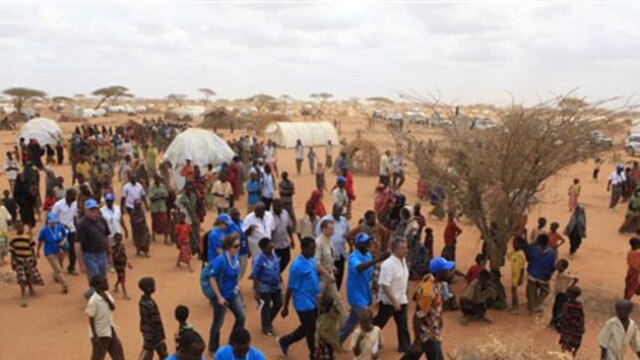This is the VOA Special English Agriculture Report.
There are growing concerns about food insecurity in the developing world. Rising food prices, weather emergencies and political problems are deepening the struggle of families in many countries.
Three United Nations agencies published a report last week before Sunday's observance of World Food Day. This year’s "State of Food Insecurity in the World" report says high prices are likely to continue. Gregory Barrow is with the World Food Program in Rome.
GREGORY BARROW: "If you look at the places where World Food Program works particularly in developing countries, you see populations of people who might be spending sixty, seventy, eighty percent of their salaries on purchasing food for their families."
The report says even short-term price increases can have a long-term effect. Reducing nutritious food early in a child’s life can affect mental and physical development and limit future earnings.
East Africa is suffering its worst drought in years. In Kenya, at least three and a half million people are going hungry, mostly in the north. Yet food is going to waste in central Kenya. Now, farmers there want the government to buy their food and get it to those in need.
Farmers say bad roads and a lack of transportation make it difficult for them to get their produce to market. Storage is another problem. And they complain about a big drop in food prices.
Nahashon Gitau farms almost three hectares about a ninety-minute drive from Nairobi. He says he regrets that he wastes at least twenty-five percent of his harvest while other Kenyans are hungry.
NAHASHON GITAU: "It is for the government to make some arrangements -- perhaps even give transport. Then, they can buy it at a good price, then give it to those people instead of asking for food from overseas, which is very bad. When we are throwing away food, they are asking for food from overseas."
Economists say the imports reduce local food prices, decrease productivity and increase dependency among the people.
Mr. Gitau says if he could receive higher prices for his crops, he could feed more Kenyans.
NAHASHON GITAU: "From my farm, I would perhaps sell every season, say, one hundred bags of potatoes, and perhaps ten thousand heads of cabbages, say, three times in a year. I can manage that product. And I have got some other farmers who can do even better than me."
Kinangop District officer Peninnih Dzombo explained why local governments have not taken action.
PENINNIH DZOMBO: "In our department, in most cases we usually work through reports and all that. So it depends on who will read the report. But we have not made the effort to have it like a priority that we want A, B, C, D addressed.”
Peninnih Dzombo says her office does not get enough money from the central government to improve roads and take other steps to help farmers reach markets.
And that’s the VOA Special English Agriculture Report. I'm Bob Doughty.
Contributing: Sabina Castelfranco, Cathy Majtenyi and Jerilyn Watson
